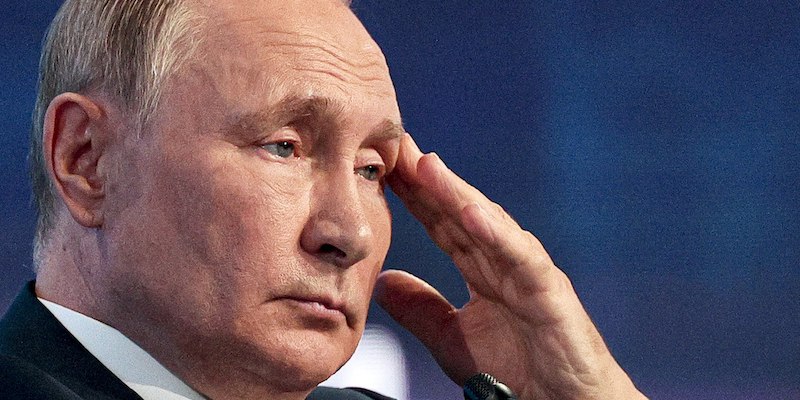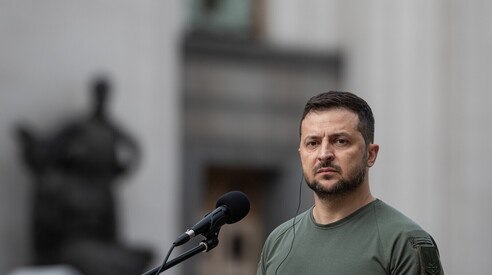Zelensky’s Confidence and Hope for Victory
Zelensky’s confidence and hope for victory shamed the Kremlin with the success of Ukraine’s counteroffensive in the northeast, and this led to the voices of war opponents being heard louder than ever by the Kremlin and warlords. Kyiv demanded more Western support, claiming, ‘We can win.’
The situation has reached a point where even Russian sources admit that Ukraine’s counteroffensive in the northeast of the country is rapidly advancing, and within a few days, Kyiv’s forces have almost reclaimed the entire Kharkiv region.
Within a few hours, the Russian army retreated from Izyum, a crucial rail hub for logistics, after the capture of Kupiansk by Ukrainian forces. This swift advance liberated over three thousand kilometers of Ukrainian territory, with more than a thousand kilometers reclaimed since the beginning of September.
Dmytro Kuleba, Ukraine’s Foreign Minister, said these advances are the result of Western military support in the war and demonstrate that with new weapons, Ukraine can win the war.
While Ukrainian battalions on the front lines claim to have advanced to the Russian border in some areas, the Russian Ministry of Defense denies the retreat from Izyum and Balakliia, speaking instead of a redeployment tactic aimed at reorganizing forces and focusing on Donbas.
However, regardless of propaganda, Ukraine’s successes have embarrassed the Kremlin, which is currently facing difficult days with heavy casualties, logistical problems, and declining morale among its troops.
The Russian opposition site Meduza reports that Ukraine’s advance has led to the postponement of the so-called referendum on annexation to Moscow in the Donbas region, as well as in the Zaporizhzhia, Kharkiv, and Kherson areas.
Although victory for Ukraine is not yet imminent, with about one-fifth of the country currently occupied, the prevalent idea and analysis, not only in Russia but among most countries in the world, that Moscow’s soldiers are destined to win and Moscow’s victory is inevitable now seems very shaky.
Moscow’s Revenge
In response to Ukraine’s counteroffensive successes, Moscow’s forces reacted by striking power infrastructure in the Kharkiv and Donetsk regions, causing widespread blackouts, especially in the eastern areas. The Russians bombed the largest thermal power plant in Kharkiv, and the city’s mayor announced that extensive attacks on key infrastructure had occurred, leaving many areas of the city without electricity and water.
This revenge by the aggressor country against civilian infrastructure is due to our military successes. President Zelensky assured in his speech that cold, darkness, hunger, and thirst will not stop Ukrainians.
Meanwhile, reactor number 6 in the city of Zaporizhzhia, which was the last active reactor, has been shut down. This decision was made due to ongoing shelling around the plant and following concerns expressed by Rafael Grossi, Director General of the International Atomic Energy Agency, who recently visited the plant with other United Nations atomic energy experts.
The Zaporizhzhia Threat
According to the Kremlin and reported by the TASS news agency, Zaporizhzhia and the risks associated with its plant were the main focus of a phone conversation between the Presidents of Russia and France, emphasizing that this conversation was initiated by French President Emmanuel Macron.
He asked his Russian counterpart, Vladimir Putin, to remove light and heavy weapons from the nuclear plant. According to the Élysée, Macron condemned the continuation of Russia’s military operations in Ukraine and emphasized Ukraine’s territorial integrity in this conversation.
Additionally, the French President discussed global food security with Putin and reminded him that European sanctions would not be applied to agricultural products or essential goods needed by farmers.
He further added that it is the joint responsibility of all international partners, especially Russia, to ensure that countries at greater risk and vulnerability do not face problems in receiving the resources and equipment they need.
Finally, Macron asked the Russian leader to ensure that, based on an agreement between Russia, Ukraine, and Turkey under UN supervision, grain exports reach those who genuinely have an urgent need for them.
Changing Landscape
Within five days, the counteroffensive in northeastern Ukraine changed the landscape of the conflict between the two countries. Many believed in Russia’s certain and inevitable victory in the war with Ukraine, but Kyiv’s forces managed to reclaim kilometers of occupied territories in less than a week.
According to the Institute for the Study of War, the territories reclaimed by Ukrainian forces are much greater than the amount Russian forces have captured in all their operations since April.
In fact, it seems that this attack was the second phase of a double counteroffensive; first Kherson and then Kharkiv. It should be noted that Kyiv managed to gather its forces in complete silence and without the knowledge of Russian intelligence forces.

Critical Days
Given recent events, everyone predicts that the coming days will be critical. It seems very unlikely that Ukraine will succeed in driving Russian forces out of its territory before summer unless an extraordinary event occurs.
However, Kyiv has shown what a difference Western support can make. Morale in Ukraine remains high, and broad political goals such as reclaiming all territories occupied by Russia, receiving compensation, and prosecuting those responsible for war crimes are being pursued and demanded with full seriousness. At present, these points certainly do not hold significant importance or status for Putin and the Kremlin.
But Putin and the Russian military leadership were questioned following unprecedented criticism from Chechen leader Ramzan Kadyrov over Russia’s recent and successive defeats and his criticism of the Russian Ministry of Defense’s strategy. The answers they will provide depend on whether they will win the war or not.
It is no secret that winning a battle does not mean winning the war, and certainly, experts need to exercise caution in their analyses regarding Ukraine’s counteroffensive. In war, one can win not only with weapons but also with images and narratives. As we have seen in recent days, most social media networks like Telegram and Twitter, and other social media channels were filled with pictures of Ukrainian flags raised in cities that were occupied by Russian forces just a few days ago.
Certainly, the Ukrainians won a major battle, not only because they managed to liberate more territories in the past week than all those occupied by Moscow since April but also because they broke the deadlock and weakened Russia’s image as an enemy that seemed nearly impossible to defeat. Now, it remains to be seen how Russia will act in light of a defeat that may be imminent.

